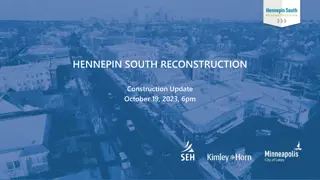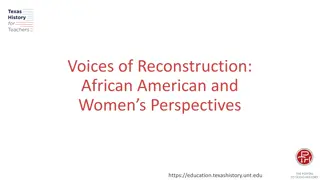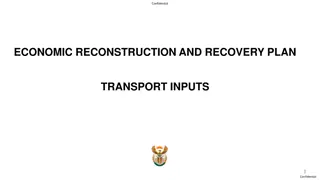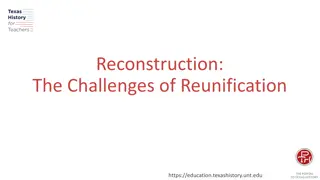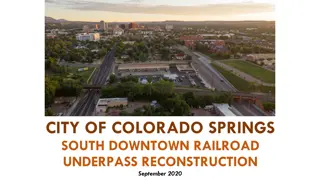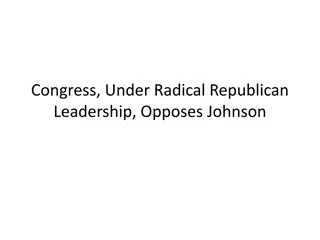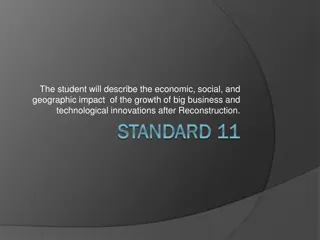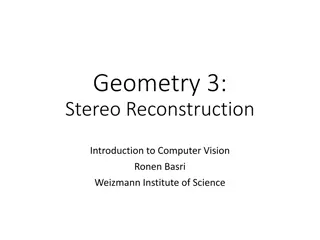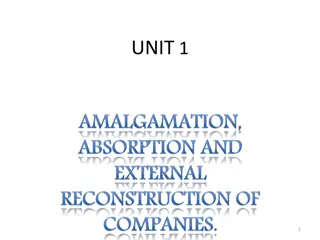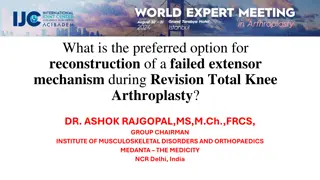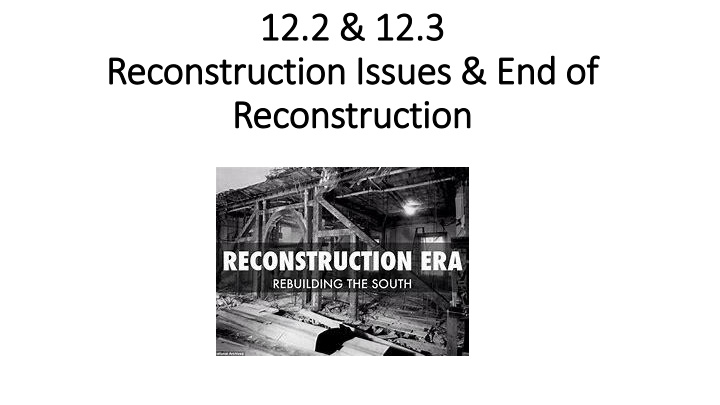
Challenges and Achievements of Reconstruction in the South
Reconstruction in the South faced challenges such as illiteracy, poor healthcare, and racial violence, while also bringing opportunities for women and advancements in education. Despite efforts to reduce racial violence, Reconstruction eventually ended due to corruption and financial collapse, leading to diminished federal control and protections for African Americans.
Download Presentation

Please find below an Image/Link to download the presentation.
The content on the website is provided AS IS for your information and personal use only. It may not be sold, licensed, or shared on other websites without obtaining consent from the author. If you encounter any issues during the download, it is possible that the publisher has removed the file from their server.
You are allowed to download the files provided on this website for personal or commercial use, subject to the condition that they are used lawfully. All files are the property of their respective owners.
The content on the website is provided AS IS for your information and personal use only. It may not be sold, licensed, or shared on other websites without obtaining consent from the author.
E N D
Presentation Transcript
12.2 & 12.3 12.2 & 12.3 Reconstruction Issues & End of Reconstruction Issues & End of Reconstruction Reconstruction
Reconstruction state constitutions mandated the creation of the public school system. Public schools grew slowly in the South. The system was expensive as there needed to be two schools in every district due to segregation. Some Republicans proposed integration but the idea was generally unpopular.
Reconstruction also offered white and black women opportunities they did not find in the North. Single women carved out new roles for themselves, especially in the school system developed during Reconstruction.
The South had many problems that made success challenging. many illiterate southerners poor quality medical care poor quality housing slower economic production than the North limited protection for African Americans racial violence rampant corruption
Congressional passing and use of the Enforcement Acts reduced racial violence. The acts made it federal crime to interfere with a citizen s right to vote. The Enforcement Acts, 1870, 1871 Congress used the Enforcement Acts to indict Klansmen throughout the South. Although violence declined, racial hatred persisted.
How and why did Reconstruction end? Corruption throughout the North and South became a more pressing issue. A financial collapse and the North s unwillingness to maintain an eternal presence in the South eroded the reach of Reconstruction.
End of Reconstruction (Continued) A series of Supreme Court decisions gave the federal government less control over the South and ate away at the few protections African Americans had gained.
Changes Brought By Reconstruction For everyone: For African Americans: tax-supported school system gave African Americans some opportunities modernized railroads reunited black families increased variety of the South s crops provided educational opportunities For women: no voting rights more economic opportunities
The Civil War had a lasting effect on state and national politics. Republican Party Became known as the party of Lincoln associated with freeing the slaves became the party of big business Democratic Party became the party of industrial workers associated with segregation in the South
The Civil War affected the balance of power between the federal government and the states. Over time, Americans chose to let the South tend to its own affairs despite the price paid by newly freed slaves.
Section 12.3 Review Questions 1. In what ways was the Grant Administration corrupt? (Pg. 419-420) 2. What are 3 reasons that the Reconstruction ended? (Pg. 421-422) 3. What were 2 lasting effects of the Reconstruction on African-Americans? (Pg. 425) 4. What was a lasting effect of the Reconstruction on women? (Pg. 425) 5. What effect(s) did the Reconstruction have on state and national politics? (Pg. 427) 6. What effect(s) did the Reconstruction have on state and federal power? (Pg. 427)
1. Vice President accused of stealing profits from railroads; he gave high-level positions to friends and acquaintances 2. Radical Republicans lost power; military expenses; Freedmen s Bureau dissolve 3. 14th Amendment (equal rights); 15th Amendment (male right to vote); land ownership; etc. 4. Suffrage movement began 5. Republicans became party of Lincoln , Democratic party became big business party 6. Balance of power


